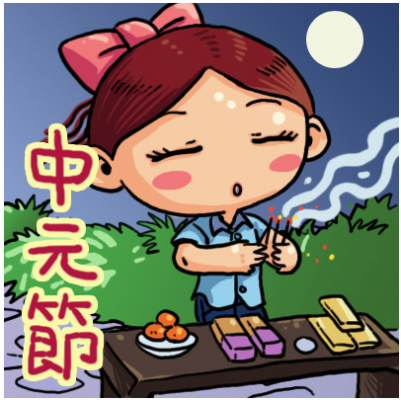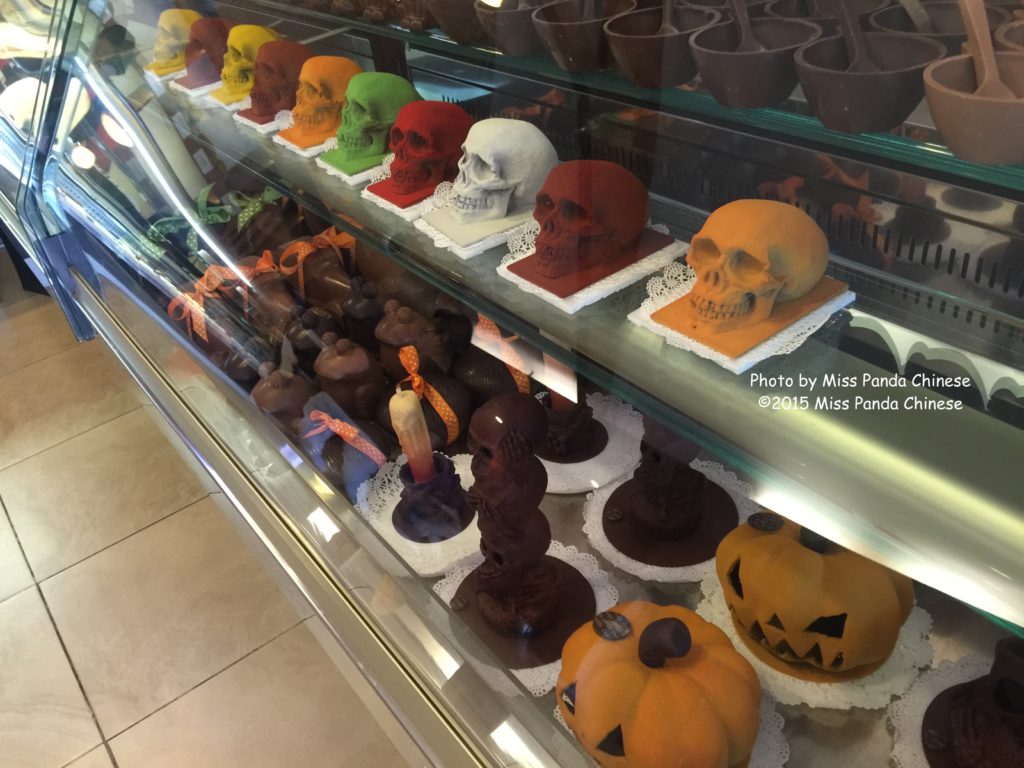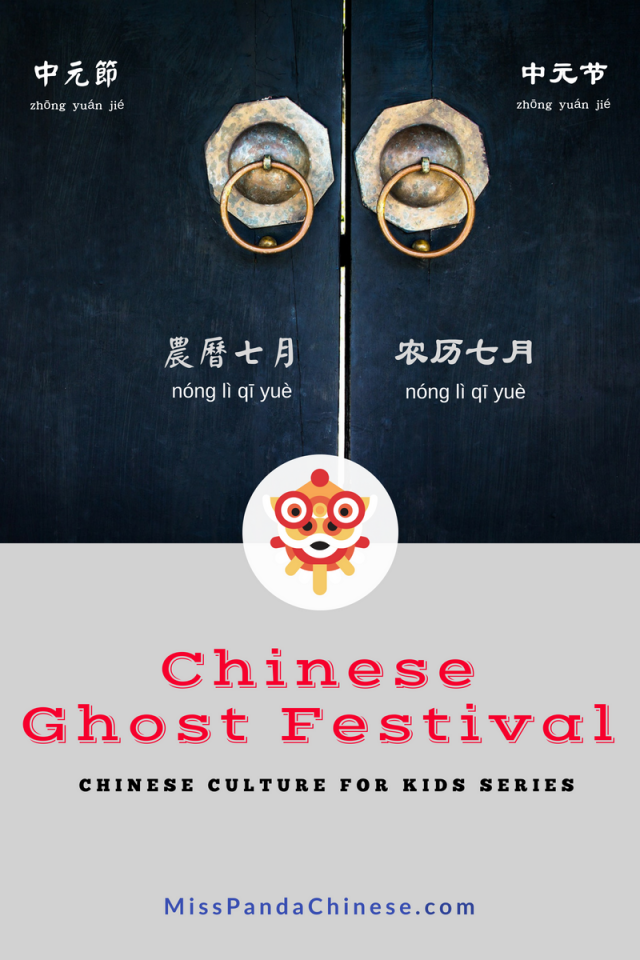Chinese Ghost Festival Meets Halloween and Day of the Dead – Is there a Chinese Halloween?
The Chinese Ghost Festival is an event in the Chinese Ghost Month!
In Chinese culture, the seventh month of the lunar calendar is the “ghost month” and it has many taboos. These taboos include that people should not swim in rivers, weddings should not be held, and moving or buying a house is prohibited, just to name a few.
Even though many young Chinese may not follow these traditions anymore, there are still many Chinese people do. With Halloween getting popular in Chinese culture, the Ghost month now seems more fun for kids than scary for children years ago. The first day of the seventh month is the day that “the Ghost Gate Opens” guǐ mén kāi 鬼門開 | 鬼门开.
The Hungry Ghost Festival – Chinese Ghost Festival – Yulan Festival
The 15th day of the seventh month of the lunar calendar is the Chinese Ghost Festival, or the Hungry Ghost Festival – zhōng yuán jié 中元節 | 中元节. It falls on August 12 this year (2022). As we teach Chinese culture, we also explore similar cultural festivals and compare similar festivals that are celebrated in other countries.

Hungry Ghost Festival- zhōng yuán jié 中元節 | 中元节 image courtesy of MSN
Ghost Month – the 7th Lunar Month
The Ghost Month is called 農曆七月 (in traditional Chinese) |农历七月 (in simplified Chinese). It reads as “Nóng lì qī yuè,” and literally means “lunar July.” The whole month of July on the lunar calendar is known as 鬼月 “Guǐ yuè,” which means “ghost month.” The Ghost month is recognized in China and Taiwan, especially for followers of Taoism and Buddhism.
Hungry Ghost Festival – 15th day of the 7th Lunar Month
The 15th day of the lunar July month is 中元節-“zhōng yuán jié” also is called 盂蘭(盆)節-“yú lán (pén) jié” – this is the “Hungry Ghost Festival” in Hong Kong. This day originates from the story of one of Buddha’s disciples, Maudgalyayana, and his mother. It is a long story connecting to filial piety.
There are many taboos and traditional practices for this day, and the whole 7th month of July on the Lunar calendar. The Hungry Ghost Festival is well-known in Hong Kong, and the Hong Kong tourism bureau does publicity for this festival annually.
News feature: Hungry Ghost Festival in Hong Kong. Audio in English and Cantonese.
Hong Kong’s Hungry Ghosts Festival (BBC) from Hélène Franchineau on Vimeo
Qī Míng Jié (Chinese): April 5
“Qīng Mīng Jié” (清明節) is a public holiday in China, Taiwan, and Chinese communities. The most important thing for this day is tomb-sweeping (掃墓).
It is the day to commemorate and honor family ancestors and deceased family members. People visit the tombs, clean up, and burn paper offerings. It is also a tradition to bring food, fruit, and flowers to the tomb for the deceased family members to “enjoy”. It is on April 5 every year. This is similar to the Dia of Los Muertos in Mexican and Hispanic culture.
Video: Story and history of Qíng Míng Jié in Chinese. Audio in Mandarin Chinese. Subtitle: Traditional Chinese.
Halloween (United States): October 31 萬聖節
Pumpkins! Pumpkins! They are in the supermarket, in the farmers’ market, and in front of the doorsteps of the neighbors. With all the young kids trying out their costumes in stores and all the Halloween decorations filling the neighborhood, we know it is time to buy bags of candies for the excitement of Halloween!
Halloween has its roots in the festival of Samhain as part of the ancient Celtic religion in Britain and some parts of Europe. Long ago, people would light bonfires and wear costumes to ward off roaming ghosts. Later, the eve before All Saints’ Day, November 1, became All Hallows’ Eve, later known as Halloween.
After being introduced by Irish immigrants, Halloween took off in America. Pumpkin carving and trick-or-treating gained popularity during the 20th century. Now, Halloween is a community and kid-friendly day. Halloween is 萬聖節|万圣节 – Wàn shèng jié. For Chinese teaching resources, check out Halloween Literacy, Numbers & Story pack!
Day of the Dead/Dia de Los Muertos
(Mexico and Hispanic culture): November 1 – November 2.
Dia de Los Muertos is a Mexican holiday. It is celebrated in Mexico and many Hispanic communities. This is the time to honor their deceased loved ones. You will see beautiful home altars decorated with flowers (such as marigolds), candles, fruit, food, and more.
Family and friends have a reunion at this time of the year to pray for family members who have passed and helped support their spiritual journey. It is similar to Qíng Míng Jíe in Chinese culture.

Bakery goods for Dia de Los Muertos in Quite, Ecuador. Photo by ©2014 Miss Panda Chinese.
Do you know any other cultures that have similar festivals? What is the one similarity you have noticed between all the festivals we mentioned in this post? What is the difference? Learning about world culture helps us to respect each other and understand that we are similar and different at the same time. I hope you enjoy this post in the Chinese culture series, and that you share this with your friends and colleagues.
Extended Learning Resource Links
Day of the Dead Around the World by Frances at Multicultural Kid Blogs
Day of the Dead – Brief History of Dia de Muertos by MommyMaestra
Hungry Ghost Festival in Hong Kong
Hungry Ghost Festival with key phrases in Chinese and English TheChairmansBao
Video: Lunar July Ghost Month origin. Audio options: English or Chinese.
Video: Qíng Míng Festival in China. Audio in English.
Qíng Míng Jíe by ETSpeaksFromHome
Memory Day Lantern Floating Ceremony in Hawaii.
More in the Chinese Culture for Kids Series:
Chinese Lunar New Year 春節|春节
Lantern Festival 元宵節| 元宵节
Dragon Boat Festival 端午節 | 端午节
Chinese Valentine’s Day 七夕
Hungry Ghost Festival 中元節 |中元节
Moon Festival 中秋節 |中秋节
Qing Ming Festival 清明節 |清明节
Winter Solstice 冬至 |冬至

Thank you for this lovely post. In India we have ‘sharad’ these are days when we remember are dead ones and feed food to priests and crows!! We pray for the peace of their soul
Thank you for sharing the Indian “sharad” with us. I will add it to the post for world culture comparison.
Thank you for sharing ‘sharad’ with us. It seems similar to ‘Qing Ming’ festival. It is wonderful to learn different cultures have similar tradition. Little stories behind cultural festivals are a part of global education that helps children to develop intercultural understanding. Thank you for sharing!
When I lived in Japan, I found their Obon holiday similar to Day of the Dead. They clean the ancestors’ graves. It’s also in Fall.
Sarah, What a great share! It is very similar to the Day of the Dead and Ching Ming Jie. Thank you for such a great insight.